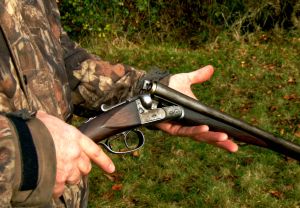 A Framingham man was arrested last week on gun charges. According to an article in the MetroWest Daily News, the police received a tip that the defendant, who is homeless, had a shotgun and that it was inside a bag buried in the woods. The tip indicated that the defendant had received the gun in exchange for an outstanding debt. After receiving the tip, the police used a dog that was specially trained to detect ballistics evidence to search the woods in the area. During the course of the search, a 12 gauge shotgun was found buried inside of a bag. Nine shells were also located within the bag. The defendant was subsequently charged with (1) possession of a firearm without a permit; (2) possession of ammunition without a firearm identification card; and (3) the improper storage of a large capacity gun.
A Framingham man was arrested last week on gun charges. According to an article in the MetroWest Daily News, the police received a tip that the defendant, who is homeless, had a shotgun and that it was inside a bag buried in the woods. The tip indicated that the defendant had received the gun in exchange for an outstanding debt. After receiving the tip, the police used a dog that was specially trained to detect ballistics evidence to search the woods in the area. During the course of the search, a 12 gauge shotgun was found buried inside of a bag. Nine shells were also located within the bag. The defendant was subsequently charged with (1) possession of a firearm without a permit; (2) possession of ammunition without a firearm identification card; and (3) the improper storage of a large capacity gun.
To prove that the defendant possessed the shotgun under G. L. c. 269, § 10, the prosecution will have to prove that: (1) the shotgun was in fact a firearm under Massachusetts law; (2) the defendant possessed the firearm; and (3) the defendant knew he possessed a firearm. In this case, where the weapon was not in the defendant’s actual possession – in other words, on his person – the Commonwealth would have to prove that he had constructive possession of the firearm. Under Massachusetts’ law, constructive possession is defined as knowledge of the item, coupled with the ability and intention to exercise dominion and control over it.
To prove such constructive possession, the Commonwealth would have to have some evidence linking the defendant to the weapon. Given the fact that the defendant is homeless, the location itself, without more, is unlikely to provide such a connection. The Commonwealth may try and connect the defendant to the weapon through forensic evidence, such as fingerprints, or DNA. In particular, if the police were able to recover either fingerprints or the defendant’s DNA on the bag or the gun, it would certainly bring the police one step closer to proving any claim that the defendant had constructive possession of the gun.
Even with such evidence, however, the Commonwealth may still have trouble proving its case. For example, if the police find forensic evidence on the bag or weapon that links either to the defendant, the defendant’s defense attorney may still have a strong argument that the defendant merely touched the weapon and/or bag at some point in time, but dispute any allegation that he “possessed” the gun. Therefore, even with forensic evidence indicating that the defendant came in contact with the gun and/or bag, without more to show when that contact was made, or that he was responsible for burying the gun and was therefore in “possession” of it, the Commonwealth will still face some significant hurdles.
Further, if the police are unable to recover forensic evidence, the case is likely to be further weakened. The Commonwealth may even be required to produce the person who provided the tip if it wants to proceed with the case. If that person saw the defendant with the gun at some point, observed him burying the weapon, or if the defendant communicated to the person that he had buried it and where, then the person could testify against the defendant. Frequently, however, the police are reluctant to put such informants on the stand, as it could compromise the person’s safety, and/or make the person reluctant to provide information to the police in the future.
Regardless of the evidence, or lack thereof, that the Commonwealth may find against the defendant, he will need a defense attorney that is ready, willing, and able to point out the deficiencies in the Commonwealth’s case. Attorney Daniel Cappetta is an experienced and skilled attorney. If you or a loved one is facing a similar situation, attorney Cappetta can help you identify weaknesses in the Commonwealth’s case, and fight to clear you of the charges. Call him for a free consultation today.
 Massachusetts Criminal Lawyer Blog
Massachusetts Criminal Lawyer Blog

